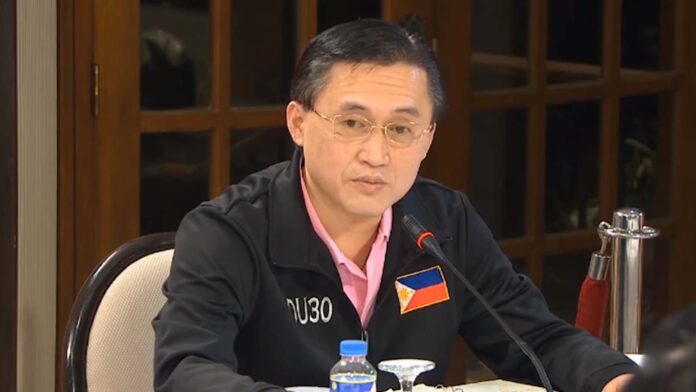Senator Christopher Lawrence “Bong” Go urged concerned government agencies to ensure that enough preparations are in order for the implementation of the proposed “Balik Probinsya” program.
He stressed the importance of identifying initiatives for the immediate, medium-term and long-term phases of the program.
“Nananawagan ako sa pamahalaan na mag-umpisang maglatag na ng mga plano para masuportahan ang ‘Balik Probinsya’ program at iba pang mga hakbang na magbibigay insentibo sa ating mga kababayan na lumipat mula sa Metro Manila at iba pang malalaking lungsod pabalik ng kanilang mga probinsya (I’m appealing to government to start crafting plans to support Balik Probinsya program and other ways to provide incentives for those who will return from Metro Manila and other big cities to their respective provinces),” Go said.
He said government agencies must identify current programs needed to help those who would want to return to their provinces after the coronavirus disease (Covid-19) crisis.
“Paghandaan na rin dapat ang mga bagong programa para maenganyo ang mga ibang tao na mag-relocate na rin (Let us also prepare new programs that would entice other people to also relocate),” Go said.
In virtual meeting attended by Go and key government officials led by Executive Secretary Salvador Medialdea on Friday (May 1), there was a consensus that the “Balik Probinsya” program will be divided into and implemented in three phases: immediate, mediate, and long-term.
“May pang-immediate para sa mga uuwi talaga pagkatapos ng ECQ, may medium-term para sa mga nais na mag-relocate pabalik sa kanilang probinsya, at may long-term para mas mabigyan ng oportunidad ang mga tao at mapalakas lalo ang ekonomiya sa iba’t ibang lugar sa bansa (Immediate phase is after enhanced community quarantine, medium-term for those who want to relocate back to the province, and long-term where economy in different parts of the country should be strengthened),” he said.
Under immediate phase, he added that the main priority of the government must be to ensure that returning individuals or families will have a safe journey to their home provinces once travel restrictions are lifted and that necessary assistance like food, transportation and livelihood can be provided for their return.
Go said that for citizens who reside in provinces but are stranded in areas under ECQ particularly Metro Manila, concerned agencies should put in place necessary measures and protocols so that they can return to their home provinces after the travel restrictions have been lifted.
“I am urging the Inter-Agency Task Force, particularly Department of the Interior and Local Government and Department of Health, to provide guidelines on how to ensure that the movement of stranded citizens will not cause the spread of the virus once they are finally allowed to go back to their home provinces,” Go said.
He further suggested that “necessary quarantine measures, Covid-19 testing and certification from Department of Health (DOH) must also be secured prior to any movement, similar to the process conducted on returning OFWs.”
For now, Go said stranded citizens may coordinate with the Department of Social Welfare and Development and the host local government unit where they are currently stranded in, so that they can be listed accordingly and be provided relief assistance as well as temporary shelter if needed.
He also said possible provision of transportation, food and financial assistance for these stranded citizens must also be considered by the government for their eventual return to their home provinces.
As for the mediate phase, Go said the provision of stable work, land and housing, working institutions for health and education, as well as equipping local government units and local counterparts of national agencies to respond to the needs of communities and maintain peace and order should be prioritized to help returning individuals and families cope with their new environment.
He said government agencies should address the availability of hospitals, schools and that LGUs should make sure to protect their community.
“Kasama na dyan ang peace and order para lumago ang ekonomiya at magkaroon ng trabaho o ikabubuhay ang mga tao sa probinsya (Peace and order should also be addressed so that economy will grow and will create more jobs for the people in the provinces),” he said.
Over the long-term, Go hopes that the “Balik Probinsya” program will facilitate a more decentralized approach on governance; boost urban renewal and rural development; provide incentives to businesses relocating to provinces; and create a more sustainable environment to bring in progress to the countryside.
“Motivating city dwellers and incentivizing businesses to relocate to the provinces will be the long-term goal. Key programs of different agencies that can help promote, boost and sustain development in the countryside must be identified and prioritized,” Go explained.
So far, key departments in the Executive branch have already identified existing programs to speed up and complement the implementation of the “Balik Probinsya” program, including the initiatives from the Departments of Social Welfare and Development, Agriculture, Trade and Industry, Education, Labor and Employment, Transportation, Housing and Health.
“Malaki po ang pasasalamat natin sa mga inisyatibong ipinapatupad o ipapatupad ng iba’t ibang ahensya ng gobyerno upang masiguro ang tagumpay ng ‘Balik Probinsya’ program (I appreciate the initiatives being implemented by various government agencies to assure successful Balik Probinsya program),” he said.
“As a legislator, I am also studying possible legislative measures needed to support the ‘Balik Probinsya’ initiative, such as the proposed CITIRA (Corporate Income Tax and Incentives Rationalization Act) that would provide more incentives for businesses to invest in other regions outside Metro Manila,” he added.
Go reiterates that this initiative must be properly planned with the full commitment of all government agencies and the private sector in order to ensure that starting fresh in the provinces would give Filipinos hope for a better future after Covid-19 crisis.


